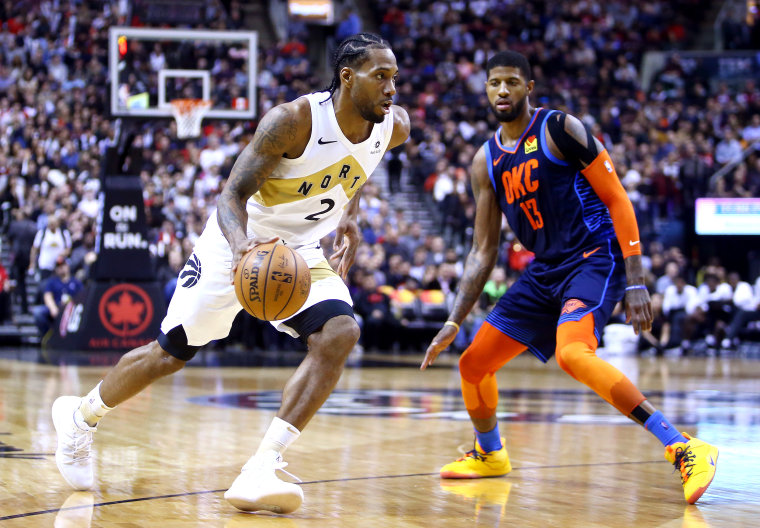When star forward Paul George requested a trade away from the Oklahoma City Thunder to the Los Angeles Clippers last week, Thunder General Manager Sam Presti read the writing on the wall: It was time to scrap whatever remained of the team and build it up from scratch. That process took its final dramatic step Thursday, when Presti traded to the Houston Rockets 2017 NBA MVP Russell Westbrook, who had been with the Thunder throughout the franchise’s existence, for an aging Chris Paul and a handful of draft picks.
The Thunder’s dismantling was born of a broader trend across the NBA, one in which the league’s star players have exercised more and more control in constructing their squads. They work with their front offices, free agents and even players already under contract elsewhere in their quest to play for teams with a shot at winning a coveted NBA championship.
We should embrace players developing and exercising any autonomy they can manage during their time in the league.
Requests like George’s, and the extraordinary measure of player agency they signify, have been greeted with a dose of scorn from the public and media, while ownership has been disconcerted by the shift in power. (In the wake of the George trade, NBA commissioner Adam Silver called trade requests “disheartening” and “an issue that needs to be addressed.”)
While it’s predictable, and even understandable, that owners would resent the usurpation of their authority over personnel moves, it’s completely unnecessary for fans and commentators to carry their baton. Instead, we should embrace players developing and exercising any autonomy they can manage during their time in the league.
Professional athletes are anxious to succeed in a very short window of time. Their careers don’t last forever, playing as they are with ticking time bombs in their muscles, joints and bones. The myriad tech investors, real estate moguls and old money weirdos who own sports franchises simply do not share their anxiety.
Moreover, to side with owners over players who are trying to succeed on the terms that sports are supposed to celebrate — winning, teamwork, championships — is to buy wholesale into the power structures (bosses get to boss us around, period) that we’ve been taught to submit to all our lives. The fact is, you don’t want your boss to tell you what to do, and you should be allowed to exploit whatever leverage you have to make your life better.
The same is true for NBA players; they just have the security and the connections to make it happen. As a consequence, they should be celebrated for asserting this agency, not disdained.
No one in the NBA took advantage of the emerging player-power movement this offseason like the Clippers, who signed reigning NBA Finals MVP Kawhi Leonard in addition to acquiring George. The addition of two All-Star forwards will remake the Clippers from a fringe playoff team — their ragtag roster lost to the Warriors in the first round this year, but not before taking two games out of pure force of will — into one of the favorites to win the NBA championship in 2020 and beyond.
All because these moves were engineered by Leonard himself. Leonard, known as much for his quiet disposition as he is for his massive hands and dominant two-way game, turned out to be a silver-tongued advocate for his own interests. Even coming off a title run in Toronto, Kawhi longed for a new start in Los Angeles, closer to his family and Southern California sun. But he wouldn’t do it if he couldn’t compete at the highest level.
So, he did what a modern superstar does: He convinced George to request a trade, told the Clippers he would sign if they did it and built his ideal playing environment.
He’s not the only NBA player taking roster-building into his own hands. Kevin Durant and Kyrie Irving, while playing for the Warriors and the Celtics respectively, were planning on teaming up long before they signed with the Brooklyn Nets last week. Golden State Warriors players were priming Durant for a move to the Bay Area almost a year before he left Oklahoma City.
Even the greats have only so much time to win, to make money, to create a life’s work they will be remembered for.
No one has embodied the era of player power, however, like LeBron James. After a frustrating tenure playing for the Cleveland Cavaliers, he engineered the free-agency coup that brought him, Dwyane Wade and Chris Bosh together in Miami. When he left Miami and returned to the Cavs, he made sure the team would be trading No. 1 pick Andrew Wiggins for star Timberwolves Forward Kevin Love.
Even the greats have only so much time to win, to make money, to create a life’s work they will be remembered for. That means they are working at cross purposes with the leagues and owners, who are always operating with a side glance to their payrolls and long-term profitability.
Elite young players get sent to teams which “earn” high draft picks in the Draft Lottery through losing. The collective bargaining agreement does everything in its power to keep them on those teams even when they do a terrible job building around the young stars. And when players manage to get out, the media accuses them of disloyalty to the fan base. Why shouldn’t James, Leonard, George and every other NBA player do whatever they can to subvert this crummy system?

